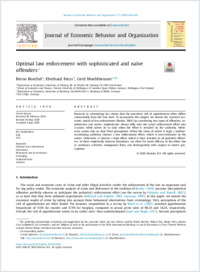Optimal law enforcement with sophisticated and naïve offenders
- Buechel, Berno University of Fribourg
- Feess, Eberhard Victoria University of Wellington
- Muehlheusser, Gerd University of Hamburg
-
2020
Published in:
- Journal of Economic Behavior & Organization. - 2020, vol. 177, p. 836-857
English
Research in criminology has shown that the perceived risk of apprehension often differs substantially from the true level. To incorporate this insight, we extend the standard economic model of law enforcement (Becker, 1968) by considering two types of offenders, sophisticates and naïves. Sophisticates always fully take the actual enforcement effort into account, while naïves do so only when the effort is revealed by the authority. Otherwise, naïves rely on their fixed perceptions. When the share of naïves is high, a welfare-maximizing authority chooses a low enforcement effort, which is over-stimated by the naïves. Otherwise, it chooses a high effort, which is then revealed to all potential offenders. In three empirically relevant extensions, we allow for lower efficacy of the effort due to avoidance activities, endogenous fines, and heterogeneity with respect to naïves’ perceptions.
- Faculty
- Faculté des sciences économiques et sociales et du management
- Department
- Département d'économie politique
- Language
-
- English
- Classification
- Economics
- License
-
License undefined
- Identifiers
-
- RERO DOC 328805
- DOI 10.1016/j.jebo.2020.07.004
- Persistent URL
- https://folia.unifr.ch/unifr/documents/308560
Statistics
Document views: 111
File downloads:
- Document: 292
